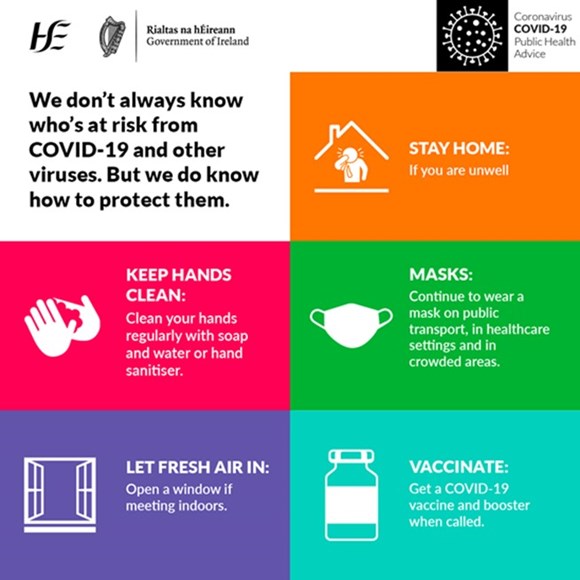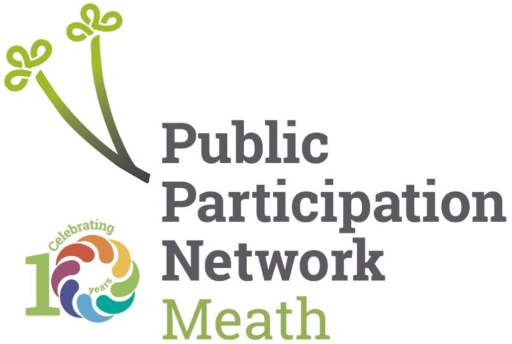HSE Partner Pack – 2nd June 2022

Thank you for your continuing support in helping to share information about important health service updates and COVID-19. Our highlight communications updates for you this week are:
Health Service Updates:
HSE encouraging the public to help protect our hospitals and emergency departments over the June bank holiday weekend
As the June bank holiday approaches, the HSE is encouraging the public to consider all care options before attending Emergency Departments as we need to protect our EDs for those patients who need urgent and emergency care.
This year, hospitals have reported record numbers of patients presenting at Emergency Departments for care and treatment, including a sharp increase in the number of patients who are seen and treated in the ED and then discharged without requiring admission to hospital. Many of these patients could have been treated at other healthcare services such as Injury Units, GP and GP out of hour services and pharmacies.
Emergency Departments will continue to see and treat patients who require urgent and emergency treatment first.
Patients who attend EDs for routine and non -urgent treatment are being advised that they will experience very long waiting times over the coming weekend and into early next week.
The HSE regrets this delay and is asking all to help our staff through a challenging time for our services by:
- Considering all healthcare options before attending ED including Injury Units, GP services and pharmacies
- Dialling 999 or 112 for emergency care if there is concern for serious illness or injury
- Continuing to wear face masks and maintaining good hand hygiene practices when attending hospitals
- Abiding by all infection control measures including visiting restrictions in hospitals and hospitals wards
As always, if you or someone else is seriously ill or needs urgent emergency care do not delay going to ED or dialling 999/112 for help.
SunSmart Campaign 2022
This year’s SunSmart campaign officially launches on June 3rd. SunSmart is run by the HSE’s National Cancer Control Programme (NCCP), in collaboration with Healthy Ireland, and works to support people to reduce their risk of skin cancer by protecting their skin from the sun. A new radio ad has launched across national and regional stations and will run until the end of August. The ad will also be played during ad breaks on Spotify playlists and audioXi podcasts. You can listen to the ad on the HSE Soundcloud page here.
You can also find more images and resources on the HSE SunSmart page.
SunSmart 2022 Campaign Partner Pack
Men’s Health Week
HSE Health and Wellbeing are hosting a webinar for Men’s Health Week on Monday, 13th June (at 12noon) with special guest former ex pro footballer Paul Ferris. You can register for the webinar here.
This year’s Men’s Health Week will begin on June 13th and the call is for men to see that the ‘Mission: isPossible’ and that support and information is available to make lifestyle changes to support their wellbeing. Get involved this year with an event in your area, for support and more information please go to the Men’s Health Forum in Ireland.
‘The Art of Being Healthy and Well’ Symposium – virtual event
HSE Health and Wellbeing, working in partnership with Creative Ireland and the Arts Council, would like to invite to this upcoming Symposium on Wednesday 22nd June (10–12:40). You can register for the event here: https://bit.ly/3PLntDl
Information on ‘Getting Healthcare in Ireland’ for Ukrainian nationals
New online content ‘Getting Healthcare in Ireland’ is now available to read in both Ukrainian and Russian languages on the HSE website.
It includes information about:
- Where to get help when you’re unwell
- Contraception
- Pregnancy
- Vaccines
- Information on other common health topics
We will continue to update information in English, Ukrainian and Russian languages.
You can find more information here.
My Health My Language
A new video series called “My Health, My Language” aims to give migrants and international protection applicants information on healthcare in Ireland. Presented by healthcare workers who live and work in Ireland but moved here from abroad, the videos cover 11 health topics in a range of languages including Ukrainian, French, Romanian, Spanish, Arabic, Irish, Russian, Polish, and Portuguese (Brazil). More languages will follow with the official launch of the series at the end of June.
Mental health supports for people from Ukraine
Information on mental health supports for people from Ukraine is now available in Ukrainian, Russian and English on www.hse.ie/Ukraine.
People arriving from Ukraine have access to a wide range of mental health supports and services. In addition to information resources, mental health promotion and self-help options, more formalised, person-centred services are also delivered by the HSE and partner organisations, and through GP and primary care services.
Information on healthcare services for Ukrainian nationals: Ukrainian and Russian language resources available
COVID-19 information for Ukrainian nationals arriving in Ireland is now available to read in both Ukrainian and Russian languages on www.hse.ie/Ukraine. Other recent updates include how to apply for a medical card and links to bi-lingual medical card forms. We will continue to update information in English, Ukrainian and Russian languages.
HSE National Consent Policy 2022
Consent is the giving of permission or agreement for an intervention, receipt or use of a service or participation in research following a process of communication about the proposed intervention.
A revised HSE National Consent Policy 2022 has been launched. The revised policy takes account of legislative and policy changes since the HSE published its first National Consent Policy in 2013. It also supports and will enable compliance with the Assisted Decision Making (Capacity) Act 2015, when it commences in June 2022
This policy applies to all care environments providing services for and on behalf of the HSE.
Access the HSE National Consent Policy.
National Patient Representative Panel
The HSE is looking for volunteers to join our National Patient Representative Panel. We want to make sure that the views and experiences of people who have used health services in the past are at the heart of our design, planning and delivery of health services. We are looking for volunteers to share their patient experiences to help us improve our health services. The time you give really depends on the time you have available.
For full information please see the attached leaflet and our webpage.
COVID-19 Updates:
People aged 65 years and over reminded to get second COVID-19 booster vaccine
The HSE is reminding all those aged 65 years and over that they can avail of their second COVID-19 booster vaccine. Those with a weak immune system aged 12 and over can also get their second booster, when it is due.
Those who are now due their second COVID-19 booster vaccine can:
- Book online now for appointments at HSE vaccination centres
- Participating GPs will be in contact to offer appointments
- Check with your local Pharmacy
- Ring HSELive at 1800 700 700 and book an appointment
- Visit HSE.ie for more information
This second booster will give you the best protection from serious illness caused by COVID-19.
The HSE encourages everyone in these two groups who have already had their first booster to get their second booster when they become eligible. This second booster will give you the best protection from serious illness caused by COVID-19.
A large number of GPs and pharmacies are now participating in the second COVID-19 booster programme.
If you have a weak immune system
People aged 12 years and older who have a weak immune system previously had one additional dose of vaccine, and were also offered a first booster dose earlier in 2022. The HSE is issuing SMS reminders to people in this group as their second boosters become due. Clinicians will also be identifying people who have become immunocompromised recently to be added to this group.
For more information on specific conditions or treatments, please find details here.
Interval between first and second booster
If you are 65 or over or 12 years and older with a weak immune system, you should get your second booster at least 4 months (at least 120 days) after your first booster. You can check the date of your last booster on your digital COVID-19 certificate.
If you have had COVID-19 in the last 4 months
You should get your second booster dose at least 4 months after your positive test result or when your symptoms started
Going to the vaccination centre
Please bring a photo ID with you. Examples of ID include passport, driver’s licence, Garda age card, student/school ID etc. but if your ID does not include your date of birth, please bring proof of your date of birth (e.g. your birth cert).
What vaccine will I get?
If you are 30 years or older you will be offered a single booster dose of the Moderna COVID 19 vaccine at the HSE vaccination centres, GPs and Pharmacies. If you are 29 years or younger we will offer you a single dose of the Pfizer vaccine. These are mRNA vaccines. NIAC has recommended people are given an mRNA vaccine for this second booster dose, and it is safe to receive if you previously had a different vaccine.
If you have not had your first booster yet
Everyone aged 12 and over can still get their first booster, and are invited to come forward and book an appointment at a HSE vaccination centre. You can find more information here.
Video explaining second booster
You can watch this video with Dr Eimear Hayes, Senior Medical Officer from the HSE National Immunisation Office. In the video Dr Hayes answers questions about the second booster dose of the COVID-19 vaccine for people aged 12 and older who have a weak immune system and those aged 65 and older, and explains their recommended COVID-19 vaccination course. Information about the recommended vaccine schedule for COVID-19 is available from the National Immunisation Office Website.
Stay safe
COVID-19 is still with us. These are important things that we can all keep doing to help reduce infection:
- isolate if you are symptomatic (even if you are fully vaccinated and boosted) or if you are diagnosed with COVID-19
- complete your primary and booster programme of vaccination
- continue to manage risk for yourself and others who are more vulnerable. You can do this by wearing masks, physical distancing and avoiding crowds as well as maintaining basic hand and respiratory hygiene
Treatment for people at the highest risk from COVID-19
New medicines are available to treat people with COVID-19 (coronavirus) who are at the highest risk of becoming seriously ill.
You can find more information about treatments and higher risk groups here.
COVID-19 vaccine for children aged 5 to 11 years
If your child is aged 5 to 11 you can book their COVID-19 vaccine appointment online at a time and date that suits you. The vaccine will help to protect them and the rest of the family too. The World Health Organization has advised that the COVID-19 vaccine is safe for children of this age. Visit hse.ie for information or to book an appointment.
COVID-19 Vaccination Programme
You can find the latest information on vaccines administered here.
COVID-19 Testing
Full details of how to get tested are available here.
COVID-19 information in other languages
Visit hse.ie/translations for a range of COVID-19 vaccine information videos and resources that have been produced in other languages, including information on COVID-19 vaccination in pregnancy.
Information videos on COVID-19 vaccination for parents of children aged 5-11 are available here.
Animated videos for children about COVID-19 vaccination
Animated videos for children are now available in English, Irish, Irish Sign Language and 11 other languages. The videos are intended as resources for parents, guardians or care workers to use to talk about the child’s COVID-19 vaccine and the process of being vaccinated with them.
The videos are also available in Arabic, Czech, Dari, French, Lithuanian, Polish, Portuguese, Romanian, Slovak, Urdu, and Yoruba and you can see all of the videos here.
Public Health Information
For updated information and advice on Coronavirus, please go to: https://www2.hse.ie/conditions/covid19/ and https://www.hpsc.ie/a-z/respiratory/coronavirus/novelcoronavirus/. Clinical and professional guidance relating to COVID-19 is available on www.hpsc.ie where you’ll find up to date guidance for healthcare settings and non-clinical settings.
Please check here for partner resources for COVID-19.
You can find translated resources here.
You can find the COVID-19 A-Z information here from the HSE’s Health Protection Surveillance Centre (HPSC).
You can view the latest information on how Ireland is responding to cases of COVID-19 here.
Ireland’s COVID-19 Data Hub is available here.
Many thanks and best wishes,
COVID-19 Stakeholder Engagement, HSE Communications

